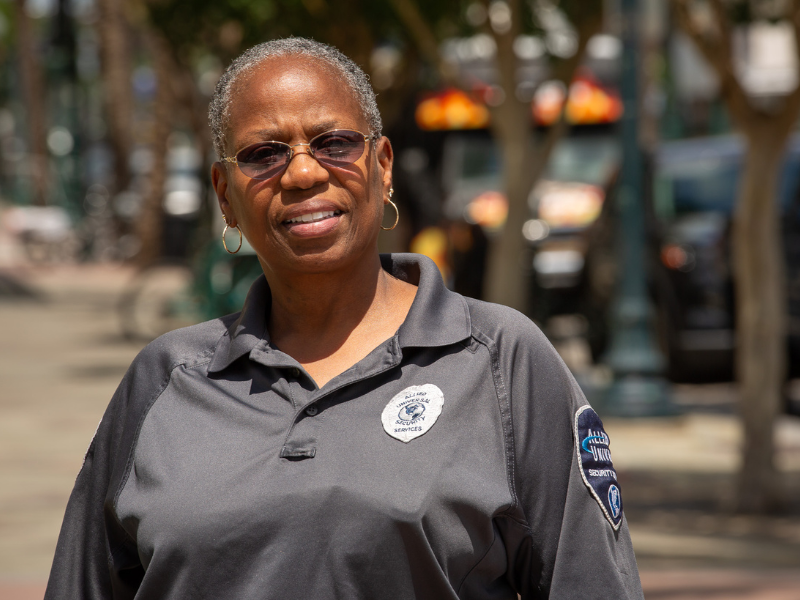Miss Taylor has seen the 'crazy and wonderful' in her time at Tulane
For nearly as long as the Celia Scott Weatherhead School of Public Health and Tropical Medicine has resided in the Tidewater Building, employees, students, and visitors to the school have been greeted by Demitries Ann Brown at the front desk.
Known as “Miss Taylor” due to a previous surname that stuck with her, Brown’s tenure working front desk security at the Tidewater Building began in 2000. Her Tulane history, however, goes back even further, to 1982 when she worked security for Tulane Medical Center just a few blocks away. Between the two locations, she’s seen over 40 years working front desks for Tulane, 25 of those years at the Celia Scott Weatherhead School.
She’s worked both directly for the university and with Tulane’s external vendor, Allied Universal, but Brown herself has remained a constant.
“It’s crazy and wonderful, but in a teaching manner,” Brown says, adding, “I've been through everything, honey!”
Thefts, floods, pandemics, and even ... snowstorms?
Staffing a security desk in an urban environment has presented numerous encounters, she shares, including thefts, drugs, and more. Thankfully, those incidents are fairly isolated, although she underlines the need for the school community -- especially students -- to stay vigilant.
Brown had been working in Tidewater for five years when Hurricane Katrina and the failure of the levees devastated the region in 2005. During the aftermath of that storm, the building took on over four feet of flood waters, closing both the school and the university.
For over four months. Brown, like many employees, had to navigate a lot of uncertainty. Her personal situation was made even more challenging and stressful when she endured the loss of her mother, who passed shortly after a relocation.
Eventually, Brown received word that she would be able to come back. But a return to Tidewater didn’t exactly mean a return to normalcy either, as post-Katrina New Orleans presented a more dangerous environment.
“We had to be on the lookout,” Brown said. “Nobody could come in certain areas of certain buildings or certain places. And we had to be on our P's and our Q's. You had to be quick to act.”
In 2020 the building was shut down again for the Covid-19 pandemic, and Brown temporarily moved back to the Tulane Medical Center to assist with security there.
“With that COVID, that's when we were over there by the med school, sleeping there. Lord, we did 12-hour shifts. We were cooking in the cafeteria. But we did what we had to do to make things work.”
Recent years haven’t been without their own challenges. In early 2024, the building experienced a fire, leading to significant water damage from the fire extinguishing system.
“We went upstairs,” she recalls. “You know me. I went upstairs because nobody else could come to work.” Brown said. “And... when I tell you, it was a disaster.”
The aftermath of that situation presented a lot of chaos. During the cleanup, it was difficult for staff to keep tabs on equipment and belongings. “If you left anything valuable available, it was gone.”
Even just a few months ago, New Orleans’ biggest snowstorm in 130 years dumped roughly a foot of snow over the area, with drifts being much taller than that.
Brown, anticipating the need for security staff on the premises, elected to come to the building ahead of the storm and stayed overnight to ensure no interruption in coverage.
That level of dedication continues to be the rule rather than the exception for Brown.
“Each time something like that happens, it's a better thought that comes out of it now. You learn what to do,” Brown said.
A heart for cancer patients
The WSPH community is keenly aware of Brown’s dedication to breast cancer awareness. Every fall, she designs ribbons and other accessories available for purchase at cost to bring awareness to breast cancer.
A series of personal connections – including diagnoses of her mother and several co-workers -- inspired that path.
“Mind you, my mom died of breast cancer. My girlfriend, Donna: Breast cancer. One of the young ladies that used to work here, Trinette, who worked at that same desk out front. She'd had breast cancer,” Brown said.
Like Brown, Bellaire “Ms. Bell” was a long-term front desk security guard. If the cancer had not taken Ms. Bell, Brown says, she would still be at her post.
“With Ms. Bell, it was like my mom -- that cancer started one place and it just travels. And when I brought my mom to the doctor, it was a little too late. They couldn't do anything.”
Making ribbons and reminding people to get screened for cancer is Brown’s way of remembering Ms. Bell and the others she has lost.
“I've had a lot of good times with the people here. I've seen them come. I've seen them go. Sometimes, you can't do nothing but laugh.” Or cry.
“Miss Taylor” is quick to deflect the attention on her and credit the entire facilities staff. But after a quarter century in Tidewater, the WSPH knows that they can count on her experience and persistence to watch out for everyone’s safety.

